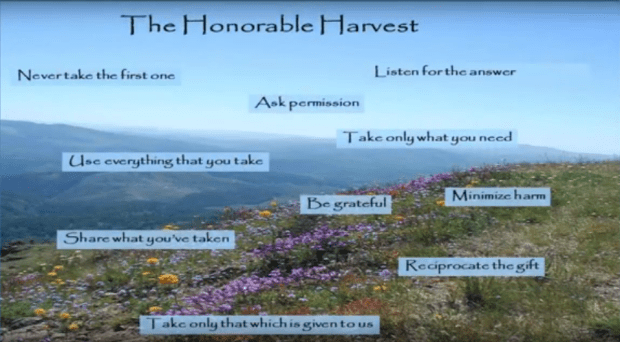
In a lovely, post-instagram-takeover conversation with Sam McKoy, he mentioned this talk to me.
The honorable harvest are rules for humans, who cannot photosynthesize, and thus, cannot garner our sustenance simply from sunlight, but actually need to deplete other life forms, to sustain ourselves.
Dr Robin Kimmerer recounts them in this 15 minute video, explaining that these guidelines are physical and spiritual – because “in the indigenous way of thinking, matter and spirit are mutually re-inforcing, whereas in the scientific world-view, they are mutually exclusive.”
Here is an extract of her talk:
The honorable harvest is a covenant of reciprocity between human beings and the living world, and these guidelines were taught to me as a plant harvester when I would go out to pick berries, or to pick medicines, with wise teachers. This is what they told me.
One of the first things is when you come out to the berry patch or get out to the woods is You never take the first one. Because it might be the last one. It’s an ethic of self-restraint that has inherent conservation values. Different people have different rules about this – sometimes you don’t take until you’ve seen four, or five, or seven. But you wait. You restrain yourself.
And then, if we encounter that next plant. you talk to the plant. Ask permission. You introduce yourself to the plant. Tell it who you are, what you have come for. What is it you need from those berries or from that medicine. If you are going to take a life, you need to be personally accountable for that transfer of life.
If you are going to ask the question, you better listen for the answer. You can listen in different ways. You can look around empirically and judge whether the plants are numerous enough and healthy enough to support your harvest. There are also ineffable ways to listen and find out what they are saying to you. And if the answer is no, it’s no. You go home. You go home empty-handed because we remember that they do not belong to us. Taking without permission is stealing.
And if you are granted permission, the honorable harvest says take only what you need, and no more. And this is a very difficult step in our materialistic, affluence-plagued society where the difference between our wants and our needs is blurred. We’re all encouraged to take everything that we get.
The honorable harvest also says you take in ways that do the least harm and that do the most to benefit the growth of the plant. You don’t use a shovel if a digging stick will do.
Use everything that you take. It’s disrespectful of a life that you take to waste it. And we have forgotten this easiest lesson – to have everything that you need is not to waste what you have.
Be grateful. Give thanks or everything that you receive. In an economy that urges us to always want more, the practice of gratitude is truly a radical act. Thankfulness for all that is given makes you feel rich beyond measure, where wealth is counted as having enough to share. Gratitude pulls us into relationship with other entities, reminding us that our very existence is in their hands. And gratitude is humbling – an antidote to the arrogance of our time. It reminds us that we are just one member in the democracy of species. It reminds us again, that the earth does not belong to us.
The next tenet of the honorable harvest is to share what the earth has shared with you so we model that behaviour in return. A culture of sharing is a culture of resilience, that can endure these waves of plenty and scarcity that come to us.
And lastly, and perhaps most importantly, reciprocate the gift. If you take from the earth, in order for balance to occur, you have to give back. We have forgotten this. Even our definitions of sustainability, are all about trying to find a formula by which we can keep on taking. We say our job as humans is not to ask what more can we take from the earth, but what can we give back in return, for the gifts of the earth.
I don’t think what we need today is more data, more studies, new technology, or more money, but an ethical shift. A change in the story that we tell ourselves about our relationship to the living world. We need acts of restoration, not only for polluted waters and degraded lands. We need a restoration of honor. An honor that we can all choose in the daily way we live – ethics made in daily decisions. So when we walk through the world, we don’t have to avert our eyes in shame, but hold our heads up high and receive respectful acknowledgement of all the other beings, in return. And the reward is not just a good feeling. It could save our lives.
Watch right through to the very end. It’s quite wonderful and invites a magical mind-shift about how we make our way in this world.

One thought on “The Honorable Harvest: thinking more mindfully about what it means to be a consumer, forager, hunter, human”